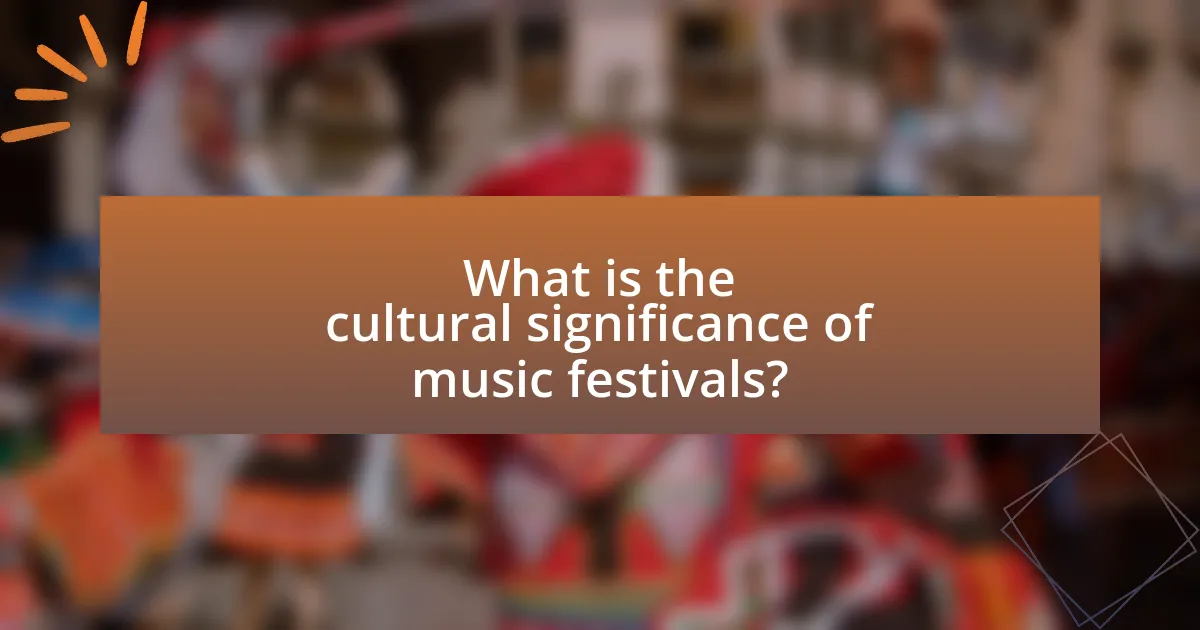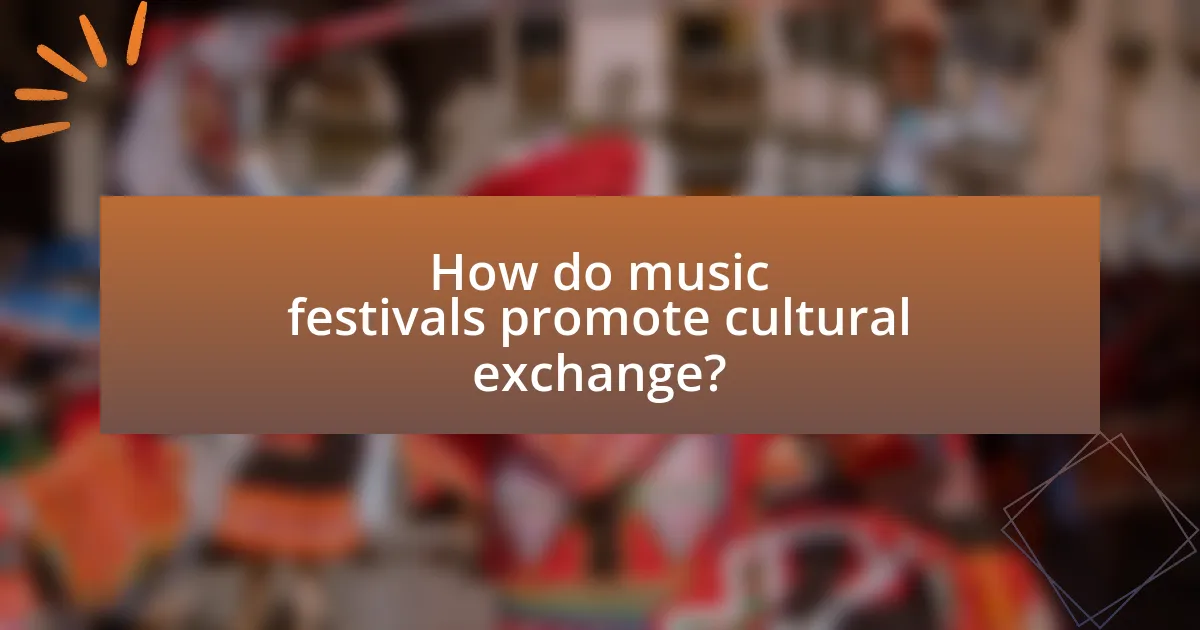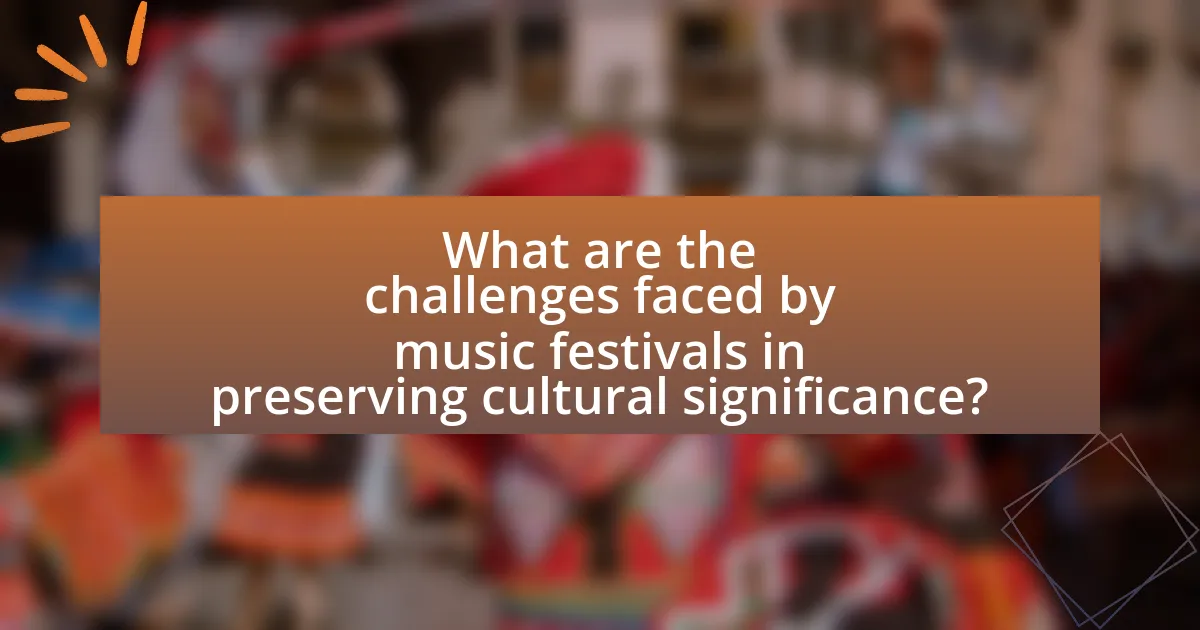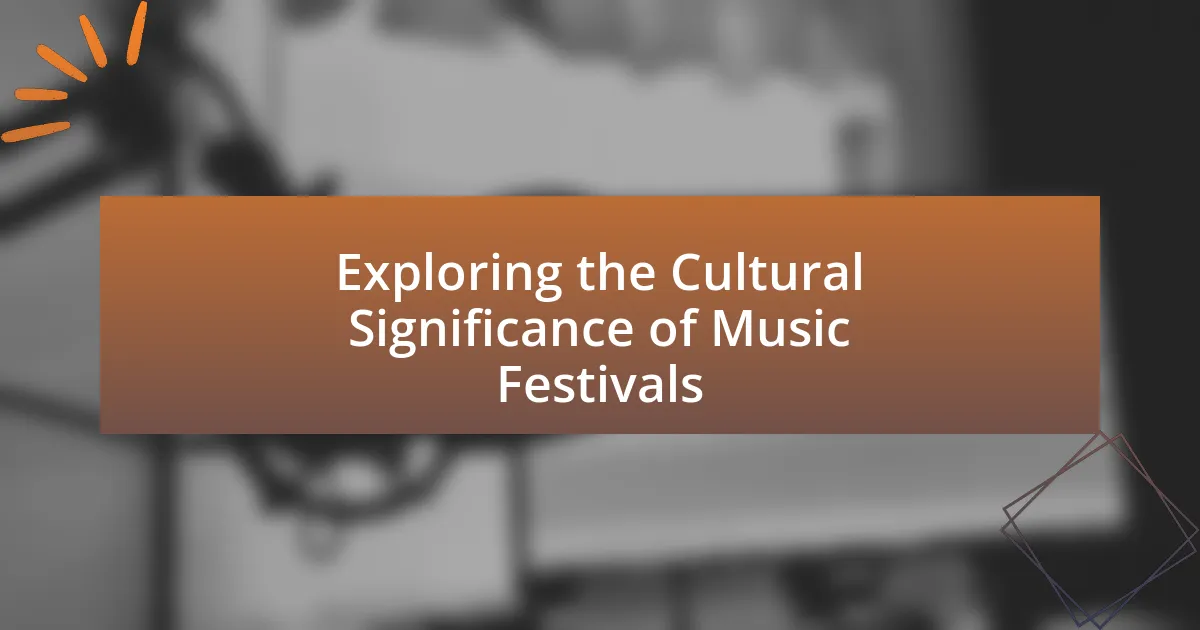Music festivals are significant cultural phenomena that serve as platforms for artistic expression, community building, and cultural exchange. They reflect cultural identities by showcasing diverse musical genres and local traditions, while also fostering social connections among attendees. The article explores how music festivals impact local economies, promote inclusivity, and address social issues, alongside the challenges of commercialization and cultural appropriation. Additionally, it discusses strategies for enhancing cultural relevance and sustainability in music festivals, emphasizing the importance of local community engagement and representation.

What is the cultural significance of music festivals?
Music festivals hold significant cultural importance as they serve as platforms for artistic expression, community building, and cultural exchange. These events bring together diverse groups of people, fostering social connections and shared experiences through music. For instance, festivals like Woodstock in 1969 not only showcased musical talent but also became symbols of social movements, reflecting the cultural zeitgeist of the era. Additionally, music festivals often highlight local traditions and genres, promoting cultural heritage and encouraging tourism, which can have economic benefits for host communities. The gathering of various artists and audiences at these festivals facilitates dialogue and understanding across different cultures, reinforcing their role as vital cultural phenomena.
How do music festivals reflect cultural identities?
Music festivals reflect cultural identities by showcasing diverse musical genres, traditions, and practices that are integral to specific communities. These events serve as platforms for cultural expression, allowing artists and attendees to celebrate their heritage through music, dance, and art. For instance, festivals like Coachella highlight contemporary American culture, while events such as the Notting Hill Carnival in London emphasize Caribbean heritage, featuring traditional costumes and music styles like calypso and reggae. Additionally, research indicates that music festivals foster social cohesion and cultural exchange, as they bring together individuals from various backgrounds, promoting understanding and appreciation of different cultural narratives.
What role do music genres play in shaping festival culture?
Music genres play a crucial role in shaping festival culture by influencing the themes, audience demographics, and overall atmosphere of events. Different genres attract distinct fan bases, which in turn affects the festival’s programming, marketing strategies, and even the location. For example, electronic dance music festivals like Tomorrowland create immersive experiences centered around visual art and technology, while folk festivals emphasize community and storytelling. This genre-specific focus not only defines the festival’s identity but also fosters a sense of belonging among attendees, as seen in the popularity of country music festivals in rural areas, which celebrate regional culture and traditions. Thus, the interplay between music genres and festival culture is evident in how they collectively shape experiences and community engagement.
How do local traditions influence music festival themes?
Local traditions significantly shape music festival themes by providing cultural context and inspiration for the event’s artistic direction. Festivals often incorporate traditional music styles, instruments, and performance practices that reflect the community’s heritage, such as the use of folk songs in regional festivals or the celebration of local historical events through music. For example, the New Orleans Jazz & Heritage Festival showcases the city’s unique blend of African, French, and Spanish musical influences, directly linking the festival’s theme to the local culture. This connection not only enhances the authenticity of the festival but also fosters community pride and engagement, as attendees celebrate their shared cultural identity through music.
Why are music festivals important for community building?
Music festivals are important for community building because they create shared experiences that foster social connections among diverse groups of people. These events bring together individuals from various backgrounds, encouraging interaction and collaboration, which strengthens community ties. Research indicates that participation in music festivals can enhance social cohesion, as evidenced by a study published in the Journal of Community Psychology, which found that attendees reported increased feelings of belonging and community engagement after participating in such events. Additionally, music festivals often support local economies and promote cultural exchange, further solidifying their role in community development.
How do festivals foster social connections among attendees?
Festivals foster social connections among attendees by creating shared experiences that encourage interaction and bonding. The communal atmosphere of festivals, characterized by music, art, and activities, facilitates conversations and connections among individuals who share similar interests. Research indicates that events like music festivals can enhance social cohesion, as participants often engage in collective enjoyment, leading to the formation of friendships and networks. For example, a study published in the Journal of Community Psychology found that attendees at music festivals reported increased feelings of belonging and community, highlighting the role of such events in strengthening social ties.
What impact do music festivals have on local economies?
Music festivals significantly boost local economies by generating revenue through tourism, hospitality, and local business engagement. For instance, a study by the National Endowment for the Arts found that music festivals can attract thousands of visitors, leading to increased spending on accommodations, food, and entertainment. In 2019, the Coachella Valley Music and Arts Festival contributed approximately $403 million to the local economy, highlighting the substantial financial impact such events can have. Additionally, local vendors and service providers often see increased sales and job opportunities during festival periods, further reinforcing the positive economic influence of music festivals on their communities.

How do music festivals promote cultural exchange?
Music festivals promote cultural exchange by bringing together diverse groups of people who share and experience various musical traditions and practices. These events often feature artists from different cultural backgrounds, allowing attendees to engage with unfamiliar genres and styles, which fosters understanding and appreciation of different cultures. For example, festivals like Coachella and Glastonbury showcase international artists, creating a platform for cultural dialogue. Additionally, the collaborative nature of performances encourages cross-cultural interactions among musicians and audiences, further enhancing the exchange of ideas and traditions. This dynamic environment not only entertains but also educates participants about global cultural diversity.
What opportunities do music festivals provide for artists from diverse backgrounds?
Music festivals provide significant opportunities for artists from diverse backgrounds by offering platforms for exposure, networking, and cultural exchange. These events allow artists to showcase their unique sounds and styles to a broader audience, which can lead to increased visibility and potential career advancement. For instance, festivals like Coachella and Glastonbury have featured artists from various cultural backgrounds, helping to elevate their profiles in the music industry. Additionally, music festivals often foster collaboration among artists, enabling them to connect with peers and industry professionals, which can result in new projects and partnerships. This environment of inclusivity not only enriches the festival experience but also promotes diversity within the music scene, as evidenced by the growing representation of underrepresented genres and artists in major festivals worldwide.
How do international music festivals facilitate cross-cultural collaborations?
International music festivals facilitate cross-cultural collaborations by providing a platform for artists from diverse backgrounds to perform and interact. These festivals often feature a wide range of musical genres and styles, attracting participants from various countries, which fosters cultural exchange and mutual understanding. For instance, events like the Glastonbury Festival in the UK and the Coachella Valley Music and Arts Festival in the USA showcase international artists, allowing them to share their unique cultural narratives through music. This interaction not only enhances the artistic experience for audiences but also encourages collaborations between musicians, leading to innovative fusion genres and cross-cultural projects.
What are the benefits of cultural diversity at music festivals?
Cultural diversity at music festivals enhances creativity, fosters community, and promotes cultural exchange. By bringing together various cultural backgrounds, festivals create an environment where unique musical styles and artistic expressions can thrive, leading to innovative performances and collaborations. For instance, festivals like Coachella and Glastonbury showcase artists from diverse genres and cultures, enriching the overall experience for attendees. Additionally, cultural diversity encourages social cohesion, as people from different backgrounds come together to celebrate shared interests, which can lead to increased understanding and tolerance among communities. Studies have shown that diverse environments can boost creativity by up to 35%, highlighting the tangible benefits of cultural diversity in artistic settings.
In what ways do music festivals serve as platforms for social issues?
Music festivals serve as platforms for social issues by providing visibility, fostering community engagement, and promoting activism. These events often feature performances and discussions that highlight pressing social concerns, such as climate change, racial equality, and mental health awareness. For instance, the Glastonbury Festival has a long history of supporting various causes, including environmental sustainability, by incorporating eco-friendly practices and raising funds for related charities. Additionally, festivals like Coachella have included initiatives that address social justice, such as partnerships with organizations focused on voter registration and advocacy for marginalized communities. This integration of social issues into the festival experience not only raises awareness but also encourages attendees to participate in activism, thereby amplifying the impact of these movements.
How do festivals raise awareness about cultural and social movements?
Festivals raise awareness about cultural and social movements by providing a platform for diverse voices and fostering community engagement. These events often feature performances, art installations, and discussions that highlight specific issues, such as social justice, environmental sustainability, or cultural heritage. For instance, the Coachella Valley Music and Arts Festival has included panels on topics like mental health and climate change, directly addressing contemporary social movements. Additionally, festivals often collaborate with advocacy groups, amplifying their messages and mobilizing attendees to participate in activism, as seen with the Lollapalooza festival’s partnerships with organizations focused on voter registration and environmental advocacy. This combination of entertainment and education effectively raises awareness and encourages action among festival-goers.
What role do music festivals play in promoting inclusivity and representation?
Music festivals play a crucial role in promoting inclusivity and representation by providing diverse platforms for artists and audiences from various backgrounds. These events often feature a wide range of genres and cultural expressions, allowing underrepresented groups, such as women, LGBTQ+ individuals, and artists of color, to showcase their talents. For instance, festivals like Coachella and Glastonbury have made concerted efforts to include more female performers and artists from diverse ethnic backgrounds, reflecting a growing awareness of the need for representation in the music industry. Additionally, initiatives such as the “Women in Music” campaign highlight the importance of gender equality in festival lineups, further emphasizing the role of music festivals in fostering an inclusive environment.

What are the challenges faced by music festivals in preserving cultural significance?
Music festivals face several challenges in preserving cultural significance, primarily due to commercialization, cultural appropriation, and changing audience demographics. Commercialization often leads to a focus on profit over cultural authenticity, diluting the original cultural expressions that festivals aim to celebrate. For instance, large-scale festivals may prioritize mainstream artists and commercial sponsors, overshadowing local talent and traditional practices. Cultural appropriation poses another challenge, where elements of a culture are adopted without understanding or respecting their significance, potentially leading to misrepresentation. Additionally, changing audience demographics can shift the focus away from cultural roots, as younger attendees may prioritize entertainment value over cultural education. These factors collectively threaten the integrity and cultural relevance of music festivals.
How do commercialization and corporate sponsorship affect music festivals?
Commercialization and corporate sponsorship significantly impact music festivals by altering their funding structures and audience experiences. These financial contributions enable festivals to expand their scale, enhance production quality, and attract high-profile artists, which can lead to increased ticket sales and broader media coverage. For instance, the Coachella Valley Music and Arts Festival, heavily sponsored by brands like Heineken and American Express, has grown into a cultural phenomenon, showcasing how corporate backing can elevate a festival’s profile. However, this commercialization often shifts the focus from artistic expression to profit generation, potentially diluting the original cultural significance of the event. Studies indicate that while sponsorship can enhance festival viability, it may also lead to a homogenization of experiences, as festivals cater to corporate interests rather than diverse artistic visions.
What are the risks of losing authenticity in music festivals?
Losing authenticity in music festivals risks alienating the core audience and diluting cultural expression. When festivals prioritize commercial interests over genuine artistic representation, they may attract a crowd more interested in social status than the music itself, leading to a superficial experience. This shift can result in a homogenization of musical genres, where unique cultural elements are overshadowed by mainstream trends, diminishing the festival’s original purpose of celebrating diverse musical traditions. Historical examples, such as the commercialization of Woodstock, illustrate how the loss of authenticity can transform a festival from a cultural milestone into a mere entertainment event, ultimately eroding its significance within the community it aims to serve.
How can festivals balance profit and cultural integrity?
Festivals can balance profit and cultural integrity by implementing strategies that prioritize local community involvement and authentic representation of cultural practices. Engaging local artists and vendors not only supports the economy but also ensures that the festival reflects the true essence of the culture it represents. For example, festivals like the New Orleans Jazz & Heritage Festival emphasize local music and cuisine, which enhances cultural authenticity while attracting tourists, thereby generating revenue. Additionally, establishing clear guidelines that respect cultural traditions and prevent commercialization can help maintain integrity. Research indicates that festivals that actively involve community stakeholders tend to have higher satisfaction rates among attendees and locals, leading to sustainable profit without compromising cultural values.
What strategies can be implemented to enhance the cultural relevance of music festivals?
To enhance the cultural relevance of music festivals, organizers can implement strategies such as incorporating local artists, showcasing regional music styles, and engaging with community traditions. By featuring local artists, festivals can reflect the unique cultural identity of the area, fostering a sense of pride and connection among attendees. Additionally, showcasing regional music styles allows for the celebration of diverse musical heritage, which can attract a broader audience and promote cultural exchange. Engaging with community traditions, such as local food vendors and cultural workshops, further enriches the festival experience, making it more relatable and meaningful to attendees. These strategies not only elevate the festival’s cultural significance but also contribute to the preservation and promotion of local culture.
How can festival organizers engage local communities effectively?
Festival organizers can engage local communities effectively by incorporating local culture and talent into the festival programming. This approach not only showcases the unique aspects of the community but also fosters a sense of ownership and pride among residents. For instance, festivals that feature local artists, musicians, and food vendors create opportunities for community members to participate actively, enhancing their connection to the event. Research indicates that festivals that prioritize local involvement can increase attendance by up to 30%, as residents feel more inclined to support events that reflect their identity and heritage.
What best practices can be adopted to ensure cultural sustainability in music festivals?
To ensure cultural sustainability in music festivals, organizers should prioritize local community engagement and representation. This involves collaborating with local artists, musicians, and cultural groups to create a festival program that reflects the region’s cultural heritage. Research indicates that festivals that incorporate local traditions and practices not only enhance the authenticity of the event but also foster community pride and participation. For instance, the Global Sustainable Tourism Council emphasizes the importance of involving local stakeholders in decision-making processes to ensure that cultural expressions are preserved and promoted. Additionally, implementing educational programs about local culture during the festival can further enhance cultural sustainability by raising awareness and appreciation among attendees.
What are some practical tips for attending music festivals to appreciate their cultural significance?
To appreciate the cultural significance of music festivals, attendees should engage with the local culture, participate in workshops, and explore diverse genres. Engaging with local culture allows individuals to understand the historical and social context of the festival, enhancing their experience. Participating in workshops offers insights into traditional music practices and community values, fostering a deeper connection. Exploring diverse genres exposes attendees to various cultural expressions, highlighting the festival’s role in promoting cultural exchange. These practices are supported by studies indicating that active participation in cultural events increases cultural awareness and appreciation.
